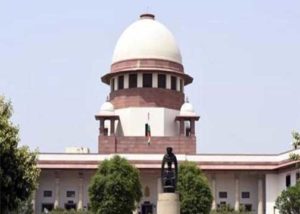 A three-judge bench of the Sepreme Court — justices N V Ramana, Sanjeev Khanna and Krishna Murari — made these observations in a 109-page judgment that upheld the disqualification of 17 rebel Karnataka MLAs but allowed them to contest the December 5 by-elections.
A three-judge bench of the Sepreme Court — justices N V Ramana, Sanjeev Khanna and Krishna Murari — made these observations in a 109-page judgment that upheld the disqualification of 17 rebel Karnataka MLAs but allowed them to contest the December 5 by-elections.
In recent months, political parties on either side of the spectrum have questioned the role of the Speaker in different assemblies, including Karnataka, Goa and Uttarakhand.
There is a growing trend of speakers of legislative bodies “acting against the constitutional duty of being neutral”, the Supreme Court cautioned on Wednesday, and called on Parliament to strengthen certain aspects of the law to discourage “undemocratic practices”.
A three-judge bench of the Sepreme Court — justices N V Ramana, Sanjeev Khanna and Krishna Murari — made these observations in a 109-page judgment that upheld the disqualification of 17 rebel Karnataka MLAs but allowed them to contest the December 5 by-elections.
The order of the apex court, which also spoke at length on the role of speakers, said: “Political parties are indulging in horse-trading and corrupt practices due to which the citizens are denied of stable governments. In these circumstances, Parliament is required to reconsider strengthening certain aspects of the Tenth Schedule so that such undemocratic practices are discouraged.”
The Tenth Schedule of the Constitution deals with provisions related to disqualification of lawmakers under the anti-defection law. The schedule lays the grounds on which a lawmaker who switched sides can be disqualified from his or her membership to Parliament or the state assemblies. Former Lok Sabha secretary general P Sreedharan supported the Supreme Court’s views and added that the the anti-defection law needed to be “concretised”. “Although I don’t know the specific context in which the apex court has said this, it is true that the provisions related to disqualification of MLAs or MPs and the anti-defection law needs to have more clarity.”
The Tenth Schedule was added to the Constitution in 1985 to tackle what the parties call “Aya Ram Gaya Ram” politics. The phrase was coined after Haryana MLA Gaya Lal changed his party three times in the same day in 1967. Eighteen years later, during Atal Bihari Vajpayee’s term as the Prime Minister, the government enacted the 91st amendment of the Constitution to restrict the size of council of ministers in state governments to not more than 15% of the total strength of the assembly to discourage defections in the lure of becoming ministers.
It said that members could defect from one party to another only in the case of a merger — which was defined as two-thirds of the members of the party shifting en masse.
In Wednesday’s order, the Supreme Court also said that “the Speaker, being a neutral person, is expected to act independently while conducting the proceedings of the House or adjudication of any petitions. The constitutional responsibility endowed upon him has to be scrupulously followed. His political affiliations cannot come in the way of adjudication. If the speaker is not able to disassociate from his political party and behaves contrary to the spirit of the neutrality and independence, such person does not deserve to be reposed with public trust and confidence.”
In another part of the order, the apex court also spoke about the need to maintain the difference between dissent and defection.
“Dissent and defection requires to be made apparent, so that democratic values are upheld in balance with other constitutional considerations. In an endeavour to maintain such balance, the role of the Speaker is critical in maintaining the balance between democratic values and constitutional considerations,” it added.
In recent months, political parties on either side of the spectrum have questioned the role of the Speaker in different assemblies, including Karnataka, Goa and Uttarakhand.
Senior advocate and Congress leader Abhishek Singhvi said it was undeniable that “all institutions work on the nature of the people working in it”.
“I have seen good Speakers, not-so-good Speakers and bad Speakers. The Karnataka assembly Speaker belonged to the first category. But I think more than the change in the Tenth Schedule, let’s adopt the original British model in which a Speaker candidate is selected before the election and no party puts puts a candidate against him or her. That alone can solve a lot of problems,” he said.
Courtesy Hindustan times
 A three-judge bench of the Sepreme Court — justices N V Ramana, Sanjeev Khanna and Krishna Murari — made these observations in a 109-page judgment that upheld the disqualification of 17 rebel Karnataka MLAs but allowed them to contest the December 5 by-elections.
A three-judge bench of the Sepreme Court — justices N V Ramana, Sanjeev Khanna and Krishna Murari — made these observations in a 109-page judgment that upheld the disqualification of 17 rebel Karnataka MLAs but allowed them to contest the December 5 by-elections.














